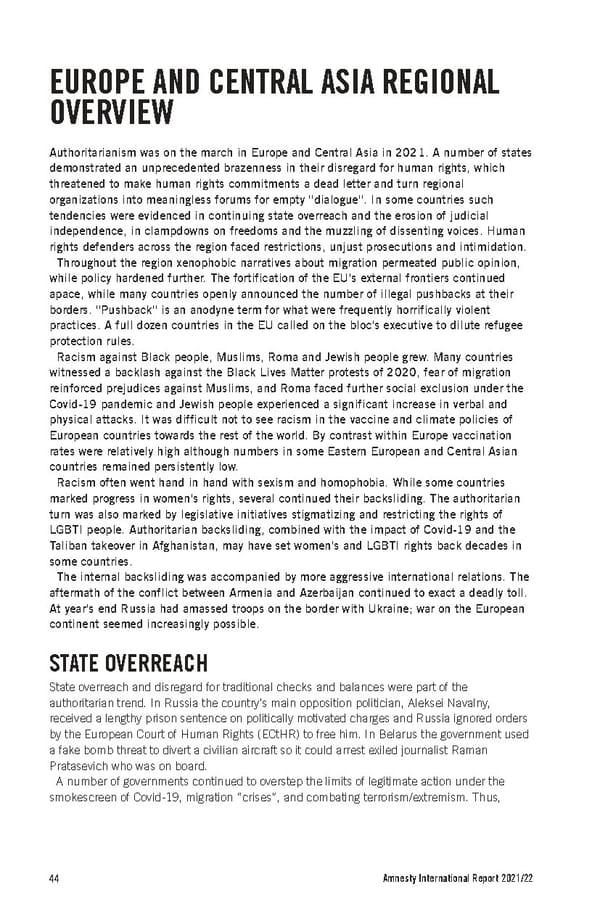EUROPE AND CENTRAL ASIA REGIONAL OVERVIEW Authoritarianism was on the march in Europe and Central Asia in 2021. A number of states demonstrated an unprecedented brazenness in their disregard for human rights, which threatened to make human rights commitments a dead letter and turn regional organizations into meaningless forums for empty “dialogue”. In some countries such tendencies were evidenced in continuing state overreach and the erosion of judicial independence, in clampdowns on freedoms and the muzzling of dissenting voices. Human rights defenders across the region faced restrictions, unjust prosecutions and intimidation. Throughout the region xenophobic narratives about migration permeated public opinion, while policy hardened further. The fortification of the EU’s external frontiers continued apace, while many countries openly announced the number of illegal pushbacks at their borders. “Pushback” is an anodyne term for what were frequently horrifically violent practices. A full dozen countries in the EU called on the bloc’s executive to dilute refugee protection rules. Racism against Black people, Muslims, Roma and Jewish people grew. Many countries witnessed a backlash against the Black Lives Matter protests of 2020, fear of migration reinforced prejudices against Muslims, and Roma faced further social exclusion under the Covid-19 pandemic and Jewish people experienced a significant increase in verbal and physical attacks. It was difficult not to see racism in the vaccine and climate policies of European countries towards the rest of the world. By contrast within Europe vaccination rates were relatively high although numbers in some Eastern European and Central Asian countries remained persistently low. Racism often went hand in hand with sexism and homophobia. While some countries marked progress in women’s rights, several continued their backsliding. The authoritarian turn was also marked by legislative initiatives stigmatizing and restricting the rights of LGBTI people. Authoritarian backsliding, combined with the impact of Covid-19 and the Taliban takeover in Afghanistan, may have set women’s and LGBTI rights back decades in some countries. The internal backsliding was accompanied by more aggressive international relations. The aftermath of the conflict between Armenia and Azerbaijan continued to exact a deadly toll. At year’s end Russia had amassed troops on the border with Ukraine; war on the European continent seemed increasingly possible. STATE OVERREACH State overreach and disregard for traditional checks and balances were part of the authoritarian trend. In Russia the country’s main opposition politician, Aleksei Navalny, received a lengthy prison sentence on politically motivated charges and Russia ignored orders by the European Court of Human Rights (ECtHR) to free him. In Belarus the government used a fake bomb threat to divert a civilian aircraft so it could arrest exiled journalist Raman Pratasevich who was on board. A number of governments continued to overstep the limits of legitimate action under the smokescreen of Covid-19, migration “crises”, and combating terrorism/extremism. Thus, Amnesty International Report 2021/22 44
 Amnesty International Report 2021/22 Page 43 Page 45
Amnesty International Report 2021/22 Page 43 Page 45